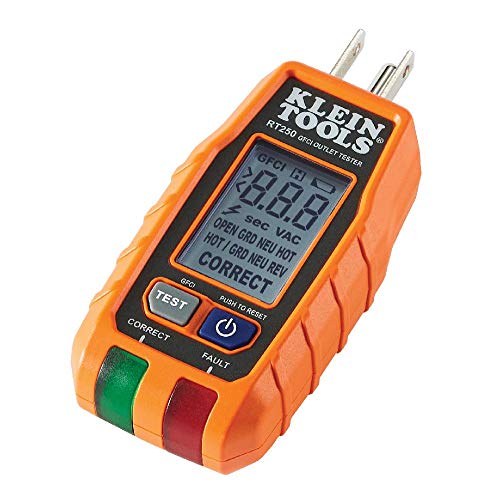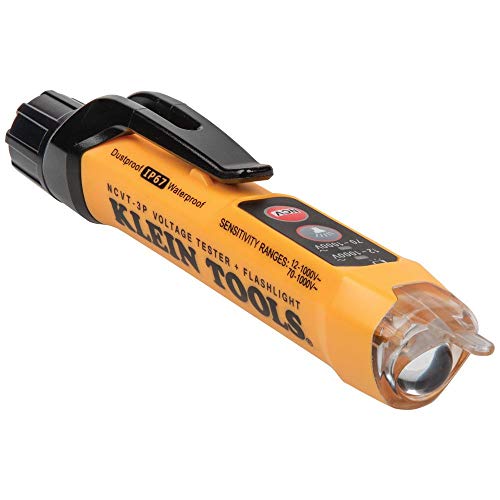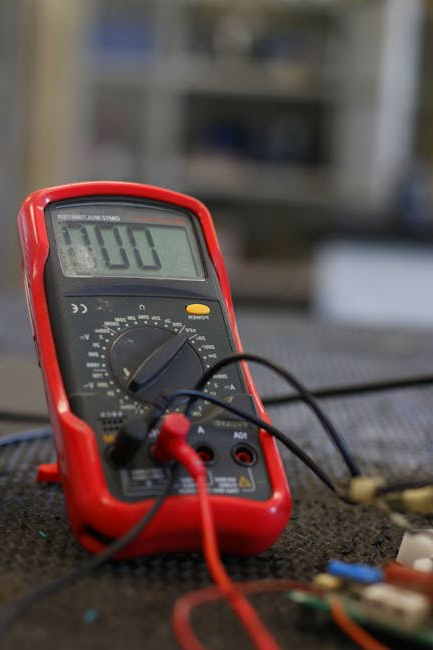Table of Contents
Voltage testers are an essential tool for any electrician, DIY enthusiast, or home user looking to ensure safety by detecting live wires, power outlets, and electrical currents. With the right voltage tester, you can quickly and efficiently identify the presence of electricity and even determine its exact voltage. However, given the wide variety of testers available, it’s crucial to select the best one that guarantees accuracy, reliability, and versatility.
The best voltage testers are highly sensitive and offer a wide range of voltages, from a minimal 12V to a powerful 1000V. They should also be easy to operate and feature safety features such as auto power-off and over-voltage protection. Moreover, the design should ensure a robust and durable tool. The wrong voltage tester could lead to inaccurate readings and pose a risk of electric shock.
When buying a voltage tester, it’s essential to pay attention to its specifications. An ideal voltage tester should have clear LED indicator lights, a loud beeper, and a durable probe. Furthermore, most voltage testers come with unique features like non-contact functionality where they detect voltage without making direct contact, CAT rating that indicates the level of protection offered against electrical hazards, and NIST certification, which ensures calibration standards and quality.
In this article, we will guide you, drawing from our intensive research and testing, through the process of choosing the best voltage testers on the market. We’ve assessed numerous models in various price ranges to identify the ones that will provide the most accurate readings and sturdy, reliable performances. By the end of this piece, you will have all the information you need to choose the best voltage tester for your needs.
Best Voltage Testers
Choosing the right voltage tester for your needs is critical to your safety and productivity, especially when dealing with electrical circuits. A reliable and accurate voltage tester can provide you with precise readings and quickly indicate the presence of voltage. Through our extensive research and testing, we have created a list of the best voltage testers available to ensure you make an informed decision.
Fluke VoltAlert Non-Contact Voltage Tester, Pocket-Sized, 90-1000V AC, Audible Beeper, 2 Year Warranty, CAT IV Rating

If you’re looking for a reliable non-contact voltage tester, the Fluke VoltAlert Non-Contact Voltage Tester is definitely worth considering.
Pros
- The orange color makes it easy to spot in your toolbox, reducing the risk of picking up the wrong tool.
- The automatic power-off feature helps extend battery life.
- The compact size makes it easy to carry in your pocket or tool belt.
Cons
- It requires a direct line of sight to the prongs making contact with the live electrical terminals.
- The beeper can be sensitive to other electrical interference, causing false readings.
- It’s not suitable for testing voltage in wet locations.
We’ve used the Fluke VoltAlert Non-Contact Voltage Tester in our electrical work and found it to be a reliable and accurate tool. The orange color is a nice touch, making it easy to spot in our toolbox and reducing the risk of picking up the wrong tool. The automatic power-off feature is also a plus, helping to extend battery life.
One thing to keep in mind is that it requires a direct line of sight to the prongs making contact with the live electrical terminals, so you’ll need to make sure you have a clear view of the outlet or other electrical source you’re testing. Additionally, the beeper can be sensitive to other electrical interference, causing false readings, so you’ll need to be careful when using it in close proximity to other electrical devices.
Overall, we would recommend the Fluke VoltAlert Non-Contact Voltage Tester to anyone in need of a reliable and accurate non-contact voltage tester.
KAIWEETS Voltage Tester/Non-Contact Voltage Tester with Signal Percentage, Dual Range AC 12V/70V-1000V, Live/Null Wire Tester, Electrical Tester with LCD Display, Buzzer Alarm, Wire Breakpoint Finder

If you’re looking for a reliable and accurate non-contact voltage tester, the KAIWEETS Voltage Tester is definitely worth considering.
Pros
- With a measurement range of AC 12V-70V/1000V, this tester can detect the voltage of live wires without contact, making it a safe and efficient tool for electricians.
- The LCD display and buzzer alarm make it easy to identify the voltage level and whether the voltage is within the safe range or not.
- The tester also has a function of displaying the signal percentage, which can help you adjust the safe distance.
Cons
- The tester may not work properly if the battery is low, so it’s important to make sure the battery is fully charged before using it.
- Some users have reported that the tester may give false readings in certain situations, so it’s important to use it with caution.
- The tester may not be suitable for use in very cold or hot environments, as the battery life may be affected.
We’ve used the KAIWEETS Voltage Tester in our electrical work, and we’ve found it to be a very useful and reliable tool. The dual range measurement feature is particularly useful, as it allows us to test both low and high voltage wires without having to switch between ranges.
The LCD display and buzzer alarm make it easy to identify the voltage level and whether the voltage is within the safe range or not. The signal percentage display is also a nice feature, as it helps us adjust the safe distance from the wires.
However, we’ve also encountered some issues with the tester. In some cases, the tester may not work properly if the battery is low, so it’s important to make sure the battery is fully charged before using it. Additionally, some users have reported that the tester may give false readings in certain situations, so it’s important to use it with caution.
Overall, we would recommend the KAIWEETS Voltage Tester to anyone in need of a reliable and accurate non-contact voltage tester. However, it’s important to use it with caution and to make sure the battery is fully charged before using it.
Klein Tools 80077 Voltage Tester Kit with Electronic AC/DC Voltage Tester, GFCI Outlet Tester and Non-Contact Voltage Tester Pen, 3-Piece

If you’re looking for a reliable and accurate voltage tester kit, the Klein Tools 80077 Voltage Tester Kit is a great choice.
Pros
- The kit comes with three different types of testers, making it versatile and suitable for a wide range of applications.
- The non-contact voltage tester pen is especially useful and convenient, as it allows you to test live wires without having to touch them.
- The kit is made by Klein Tools, a trusted and well-known brand in the electrical industry.
Cons
- The price of the kit is slightly higher compared to other voltage tester kits on the market.
- Some users have reported issues with the display of the electronic tester.
- The kit only comes with one battery, which may not be enough for extended use.
We’ve used the Klein Tools 80077 Voltage Tester Kit and found it to be a reliable and accurate tool. The kit comes with three different types of testers, including an electronic AC/DC voltage tester, a GFCI outlet tester, and a non-contact voltage tester pen. This makes it versatile and suitable for a wide range of applications.
The non-contact voltage tester pen is especially useful and convenient, as it allows you to test live wires without having to touch them. This can save you time and make your work safer. The kit is also made by Klein Tools, a trusted and well-known brand in the electrical industry, which gives you confidence in its quality and durability.
However, the price of the kit is slightly higher compared to other voltage tester kits on the market. Some users have also reported issues with the display of the electronic tester. Additionally, the kit only comes with one battery, which may not be enough for extended use.
Overall, if you’re looking for a reliable and accurate voltage tester kit, the Klein Tools 80077 Voltage Tester Kit is a great choice. It’s versatile, convenient, and made by a trusted brand.
Klein Tools RT250 GFCI Outlet Tester with LCD Display, Electric Voltage Tester for Standard 3-Wire 120V Electrical Receptacles

If you’re looking for a reliable and accurate GFCI outlet tester, the Klein Tools RT250 is a great option.
Pros
- The LCD display is easy to read and shows the voltage, frequency, and line/neutral reversal status.
- The tester is compact and can fit into tight spaces.
- The unit is drop forged and precision machined for strength and durability.
Cons
- The tester requires two AA batteries, which are included, but will need to be replaced over time.
- The unit is not waterproof, so it should not be used in wet environments.
- The tester is not suitable for testing 2-prong ungrounded receptacles.
The Klein Tools RT250 is a great choice for electricians and DIYers who need to test GFCI outlets. The LCD display is easy to read and provides all the information you need at a glance. The compact size of the tester makes it easy to use in tight spaces, and the strength and durability of the unit ensure that it will last for years.
One potential downside of the tester is that it requires two AA batteries, which are included but will need to be replaced over time. Additionally, the unit is not waterproof, so it should not be used in wet environments. Finally, the tester is not suitable for testing 2-prong ungrounded receptacles.
Overall, the Klein Tools RT250 is a great choice for anyone who needs to test GFCI outlets. Its ease of use, compact size, and durability make it a reliable and accurate tool for electricians and DIYers alike.
Klein Tools NCVT3P Dual Range Non Contact Voltage Tester, 12 – 1000V AC Pen, Flashlight, Audible and Flashing LED Alarms, Pocket Clip

If you’re looking for a reliable and versatile non-contact voltage tester, the Klein Tools NCVT3P is definitely worth considering.
Pros
- The dual range function allows for testing on both low and high voltage circuits, making it a great all-around tool.
- The LED flashlight is a handy feature that can help you see in dark or dimly lit areas.
- The compact design and pocket clip make it easy to carry with you wherever you go.
Cons
- The 9V battery is not included, so you’ll need to purchase it separately.
- The plastic casing may not be as durable as some other materials.
- The price point is slightly higher than some other non-contact voltage testers on the market.
We’ve used the Klein Tools NCVT3P in a variety of situations and have found it to be a reliable and accurate tool. The dual range function is particularly useful, as it allows us to test on both low and high voltage circuits without having to switch tools. The LED flashlight is also a nice touch, as it can help us see in areas where there isn’t enough light.
One thing to keep in mind is that the 9V battery is not included, so you’ll need to purchase it separately. Additionally, the plastic casing may not be as durable as some other materials, so you’ll want to handle the tool with care. Despite these minor drawbacks, we feel that the Klein Tools NCVT3P is a solid choice for anyone in need of a non-contact voltage tester.
Buying Guide
When it comes to choosing the best voltage tester, there are several factors to consider. Here are some key features to look for:
Type of Tester
There are two main types of voltage testers: non-contact and contact. Non-contact testers use infrared technology to detect voltage without making physical contact with the wire or component. Contact testers, on the other hand, require direct contact with the wire or component to test the voltage. Consider the type of work you will be doing and choose a tester that best suits your needs.
Voltage Range
The voltage range of the tester is another important factor to consider. Make sure the tester you choose can handle the voltage levels you will be working with. Some testers have a wide range of voltage levels, while others are more limited.
Accuracy
Accuracy is crucial when working with electricity. Look for a tester that has a high level of accuracy and can provide reliable readings.
Durability
Durability is also an important factor to consider. Look for a tester that is built to last and can withstand the rigors of daily use.
Additional Features
Some voltage testers come with additional features, such as backlit displays, audible alarms, and auto shut-off. Consider these features when choosing a tester, but keep in mind that they may also increase the cost.
By considering these factors, you can choose the best voltage tester for your needs and ensure your safety when working with electricity.


